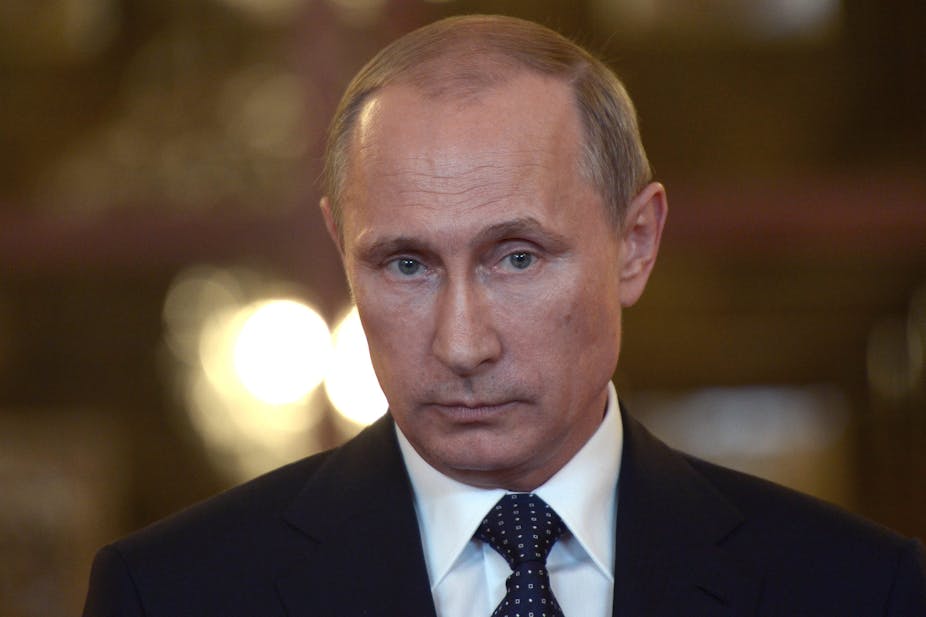After a fortnight of bitter partisanship over carbon and the like, the tragedy in Ukraine brought all federal politicians – still in Canberra on Friday to deal with budget legislation – together in shock and national unity.
Tony Abbott spoke with Bill Shorten before making his statement to Parliament about the downing of the Malaysian Airlines plane by a missile. In the House, Shorten pledged to support whatever actions the government takes in the days ahead.
For Australia, the attack has consequences beyond the immediate and horrific deaths of 28 of its people. It opens the potentially complex issue of whether Russian president Vladimir Putin should be allowed to attend the November G20 leaders’ meeting in Brisbane.
With the Russians so far not only being difficult but (when Foreign Minister Julie Bishop met ambassador Vladimir Morozov) trying to blame Ukraine, Abbott left in the air the matter of Putin’s G20 presence. Asked whether the president would still be welcome if he didn’t help with the investigation, Abbott said this was a “very, very fair question”.
“I don’t want to pre-empt what might happen in the weeks and months ahead,” he told a late afternoon news conference in his Prime Ministerial courtyard. “I just want to say that it is absolutely imperative, if Russia is to maintain any international standing at all, that there be complete Russian co-operation.”
Putin’s attendance has arisen before. Responding to Russia’s move earlier this year to annex Crimea from Ukraine, Bishop left open the option of Putin being excluded from the G20 meeting.
There was a quick bite back from the BRICS countries – Brazil, Russia, India, China and South Africa. Their foreign ministers warned: “The custodianship of the G20 belongs to all member-states equally and no one member-state can unilaterally determine its nature and character.”
Putin has already been booted from one major international summit recently. He was due to host the G8 meeting last month but that wasn’t acceptable to other countries. The United States, Britain, France, Germany, Canada, Italy and Japan instead gathered in Brussels without him. He was reported as spitting out a line to Kremlin reporters: “I would like to wish them bon appetit”.
The facts of what happened with Malaysian Airlines MH17 are still to be clarified, beyond that the missile was apparently fired by Russian-backed rebels. As has been observed widely, a missile capable of felling a big plane at such altitude wasn’t made by locals. Abbott said the missile was “quite possibly, maybe probably” Russian supplied; Morozov adamantly denied this to Bishop.
Even if Russia was not directly involved in the attack, it is deeply implicated if its weaponry was used.
Flagging a bipartisan stand, Shorten told Parliament that “Labor is prepared to support the government and co-operate with the Prime Minister … Whether or not that involves anything to do with the G20, we say to the government, we will work with your measured approach”.
Shorten said that as Abbott had discussed with him earlier in the morning, “it is a time for temperate responses, for cool heads and measured action”.
Trying to exclude Putin from the G20 meeting would be both difficult and set a precedent that might not be in the long term interest of the grouping. The G20 is a big group, increasing the chance, once a precedent is set, of other attempted exclusions in the future when an issue with one or other of the countries arose.
Given the earlier stand by the BRICS countries it would be hard if not impossible for Australia to act unilaterally. That could lead to an international row overshadowing the occasion, and the possibility of some countries pulling out in protest.
On the other hand, while some countries might resist sin-binning Putin, it’s also possible others might press for it, with Australia caught in the middle.
Asked whether it would be a decision for Australia or the wider group, Abbott said that Australia would be reluctant to act unilaterally because the G20 was a very important international gathering. “Nevertheless it is also very important that Australia act with the strength and self-respect that you would expect of a country of our standing.”
Mike Callaghan, program director of the G20 studies centre at the Lowy Institute, believes any decision to exclude Russia should be taken by the full G20 membership, not just Australia. He points out that the G20 is an economic grouping, not a political or security one, and having Putin present in Brisbane “would provide an opportunity for dialogue” at the margin of the meeting.
For Abbott it could become a delicate mix of diplomatic and domestic politics. If Russia takes a defiant and uncooperative stance there would be a lot of pressure on the Prime Minister to seek diplomatic retaliation for the Australian deaths.

